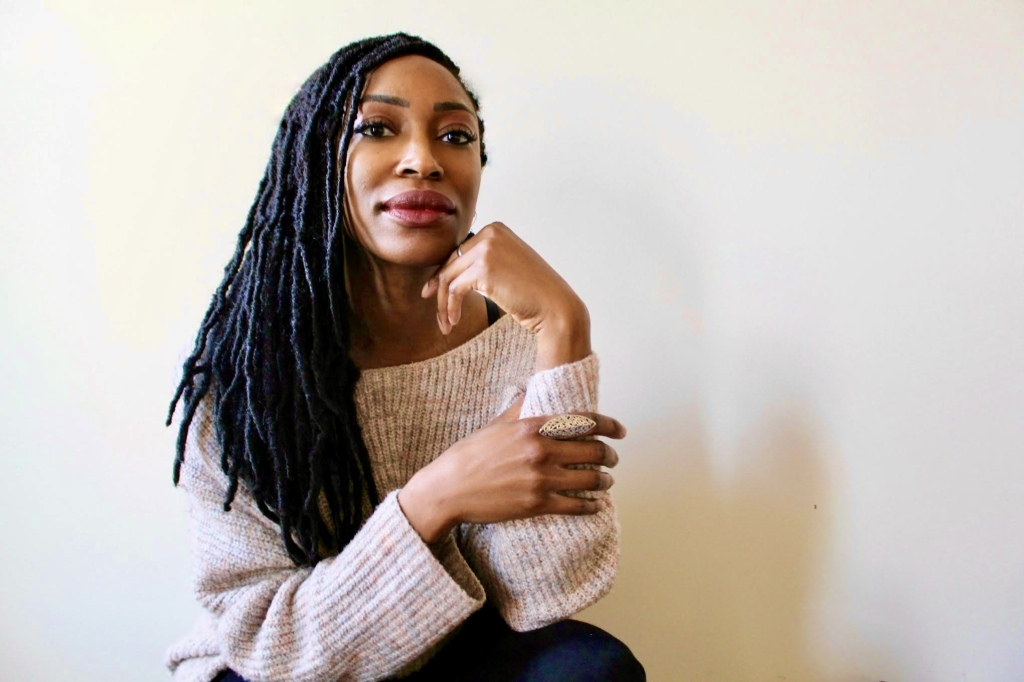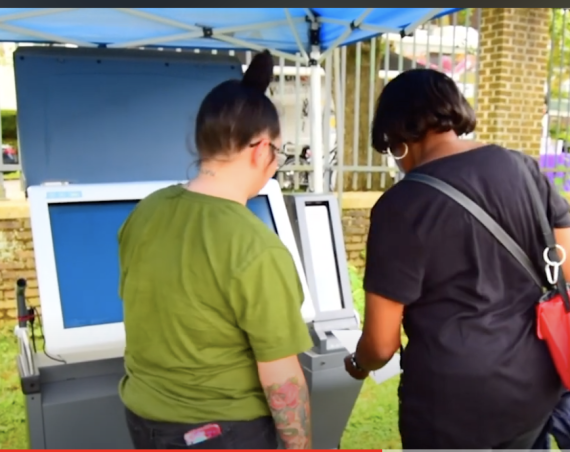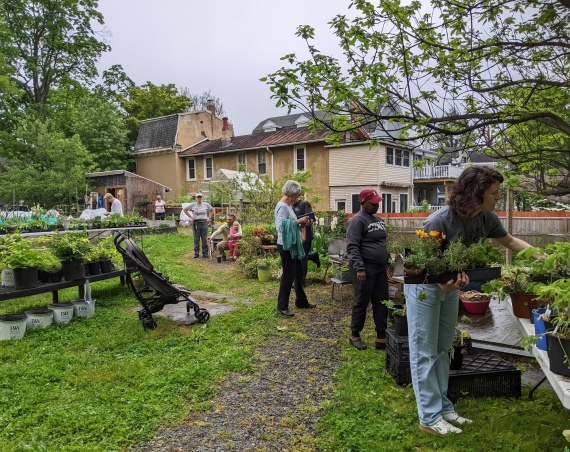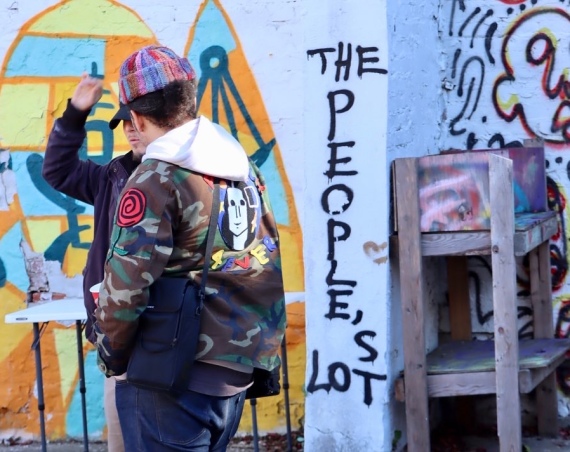Peace Ike’s “Dinner & Discussion” series creates a “brave space” and welcoming environment for people to discuss divisive topics with empathy and compassion.

The emergence of social media, digital spaces, and forums has made it possible for people to discuss formerly taboo topics like race and politics more openly. Molly Davis, a resident of Germantown, isn’t drawn to those online spaces, feeling they can be unproductive and sometimes an “echo chamber.” So Davis eagerly joined in when she saw an opportunity for people of all backgrounds and identities to discuss their thoughts and experiences of the world — in person.
This opportunity came through the “Dinner & Discussion” series, curated and facilitated by Germantown transplant Peace Ike in her home. Ike is a Pittsburgh native who settled in the neighborhood in 2017. Two years later, after observing the ways the masses engaged in online discourse, Ike desired to create a space where differing viewpoints are respected and honoring diversity is expected.
She then turned her desires into a real-life social experiment when she began getting ten people of different backgrounds together to discuss topics that can divide communities of people on social media.
“[The attendees] are differing in race, they are differing in age, they’re differing in religion, and they’re differing in political affiliation or political spectrum,” says Ike, talking about the different types of people who populate each gathering. Ike does this deliberately so that no two people are exactly the same and to maintain balance and diversity at the table.
While Davis typically enjoys meeting new people, she expressed nervousness about entering the space. She says, “I was kind of thinking, oh my God, I don’t know how this is going to go because, normally, you don’t talk about hard things with strangers. That’s kind of social rule number one.” But she says Ike’s facilitation and curation of the space helped to alleviate any points of contention that she may have felt, even during the discussion.
How does Ike do it? Despite the contentious topics, she creates a space that maintains levity and encourages people to listen to understand rather than listen to assume and respond. It’s not just one thing but a recipe of strategies and action steps she follows.
Before all else, Ike has to carefully choose the guests, as stated earlier, to ensure diversity. That means she’s also tasked with letting folks know there’s insufficient space for their specific demographic.
She explains her intentions: “If I have seven people who all think alike, look alike, come from the same background, and three people on the other side, it’s not very fair or balanced, and I never want anyone to feel like they’re being ganged up on. So a lot of intentionality goes into how I choose the participants.”
All the guests are asked to bring a dish, one of three requirements besides an open mind and one question they want to ask. Ike talks about how it aids a space of vulnerability, saying, “I don’t know where I’ve heard it, but I know it to be true that when you bring something you’ve prepared, you’re already tearing down one wall.”
When guests arrive, they throw their questions into a hat. The questions will be asked randomly during the discussion to keep things anonymous. Ike says this helps to create a sense of safety. Germantown native Monique Martin has been to several of the gatherings. She says the anonymous questions leave a certain level of freeness.
When everyone has ushered themselves to the dinner table, everyone introduces themselves. More recently, she’s introduced the idea of getting everyone to promise to live by rules and norms when at the table, that everyone recites together. For example, everyone may pledge not to interrupt one another, and they hold themselves to it.
During discussions, Ike makes it her mission to have everyone in the space share their thoughts — simply because they can. “I will sometimes call on someone to share their thoughts, just to really encourage people that you can say what you really feel here,” she says.
Davis admires Ike’s facilitation style, saying that if similar folks tried to answer more questions than others, she would tell the group they should hear other perspectives. She also says Ike remained neutral because it helped to alleviate possible assumptions. Martin says Ike’s facilitation reminded her of mock trials in high school, where teachers give students something they disagree with and tell them to argue the opposite position.
“It was amazing to me,” Martin says, recalling the space and Ike’s facilitation. “And when everybody left, it didn’t mean your mind would change, but you came out respecting one another.”
Ike says she’s never had to step in because someone used offensive language. She attributes this to the intentionality and expectations pre-set for the space, saying when “you walk into the space, you just know it’s not the place.”
She clarifies that in the invitation email, folks are reminded that the discussions may be uncomfortable. If someone cannot control their emotions, it’d be best not to attend the session. She says there have been times when folks exercise that right and cancel their reservations.
Ike says filling a space with ten people is sometimes the biggest task. Between finding the right participants to fill the space and possible cancellations, Ike can sometimes find herself trying to fill the table on the week of a gathering.
The intentionality about who fills up the space often also brings backlash. So, if Ike says there are too many folks of one race, she may be called a racist, though the intention is to create a balance of individualities. However, Ike has a waitlist for those who may not have received formal invitations on their first request.
“It doesn’t really bother me too much,” Ike says if she gets a harsh response when the table is full. “But what really breaks my heart when I see people respond a certain way is just that. This is the problem. This is why we’re having these nights. I so want people to understand how unhelpful jumping to conclusions or throwing out distasteful remarks or calling names or putting people in the box or labeling is.”
Ike also notes that she’s shifting her language to describe these social experiments. While a “safe space” was once her go-to for these gatherings and her home, she uses a new phrase to encourage people to speak and seek truth.
“I’ve started calling them brave space because so often we tiptoe around the world more concerned about who’s going to harm us than bravely speaking the truth… our truth. We cultivate a society where everyone’s walking on eggshells and no one’s honest. And I don’t want to live in a world like that, So I don’t want to put leashes on anybody who comes to dinner.”
Ike feels that if folks disagree with each other, they should explore the disagreement respectfully, as “this is how we teach people how to actually interact as human beings.”
Ike expresses concern for the upcoming Gen Z demographic, saying she’s unsure if they’ve been taught to respond to things that hurt without getting enraged. “Emotions are healthy and good, but when they don’t allow us to think critically, they become inhibiting,” she shares. She says this is a skill she hopes all the guests can exercise at the gatherings.
While agreeing with Ike’s sentiments, Martin also believes that people generally aren’t taught how to communicate their own thoughts and feelings wholly, so that’s where the disrespect can come in sometimes. She says, “I think people [should] learn how to reason out their own opinions first and be able to express those effectively and then be able to combat what someone else says.”
Ike says a gathering is successful if people leave, saying they think about something differently than they came in. She assures us that there is never a time when attendees haven’t shared their shifted perspectives before leaving.
Davis talks about how she’s seen the impact in her life, meeting new people and seeing the community she envisions grow. “I was at Ultimo six months later, and I saw one of the people from there waiting for the bathroom, and she was like, oh my God, you’re that person. And we just began talking, and she also shared how she thought it was such a special night,” she says.
If given the opportunity, she’d definitely attend another one. She shares Ike’s hope to see this social experiment grow and be modeled on larger scales and in other parts of the country. While Ike would love to travel the world and teach these models, she also says it’s hard work finding the resources to do so. However, she assures that this model “has to be replicated.”
Over the past six months to a year, the gathering organizer has noticed a few consistent themes, including topics affecting the younger generations, like the education system and the age of technology. The Israeli-Palestinian conflict is another more recent topic, and she says former president Donald Trump’s name appears at least once every session.
One commonality Ike found interesting was “general disappointment with how the world is going.” She says there’s been a collective sentiment of not just being able to pin things on specific groups of people, which leads the groups to seek solutions to problems thoughtfully.
She elaborates, saying, “I’ve been so happy to see people meet over shared disagreements because then that’s where the real conversation starts. [People start to question,] ‘what can we do?’ That’s when we start brainstorming, and the magic happens. And it’s really special.”
With so many sessions between the inception and the most recent on February 15, Ike says she has many favorites. But she shares one of the most significant groups of folks she’s had to facilitate, revealing a conservative, liberal, libertarian, socialist, and Marxist. She laughs, saying, “I said, oh my gosh, this is like the beginning of a joke. But I also was like, we got this. You set the groundwork.”
She touches on how she feels to be able to host these gatherings, saying, “It’s so satisfying. It really feels like I’m seeing. It’s like a spiritual thing. I’m seeing love in action. I’m seeing what happens when we remember who we are, that we are not our political affiliations, we are not just our ideas, but we’re human at the core.”
She explains that people’s perceptions of the world are shaped by their personal experiences. People’s childhood, environment, upbringing, education, and past traumas all contribute to how they perceive and understand the world around them. She emphasizes that it is important to consider these factors when folks interact rather than vilifying them for their beliefs or views. By understanding their background and experiences, she feels people can better understand and empathize with their perspectives.
Martin agrees with these sentiments when it comes to her takeaways. She says, “I got to hear and see other people’s opinions. Not only that but also to see people’s hearts, which I think is different from a social media space. When you’re in person, you get the spirit of a person, right? You kind of get their essence, and people become likable.”
While there hasn’t been an official date set for the next “Dinner & Discussion,” folks can always visit thegatheringplacephilly.org to see when the next one will be available and other offerings. Look out for our March 28 airing of the Germantown Info Hub Hour, where you can hear more about the Dinner and Discussions with Peace Ike.
When given the space to give final sentiments, Ike said, “I have a big heart to see change, and sometimes it’s overwhelming. But I’m trying to encourage myself and remember that those small drops in the ocean do have ripple effects. And even if it’s one person in the neighborhood, in the city, or in the country, it’s still going to cause a ripple effect.“



